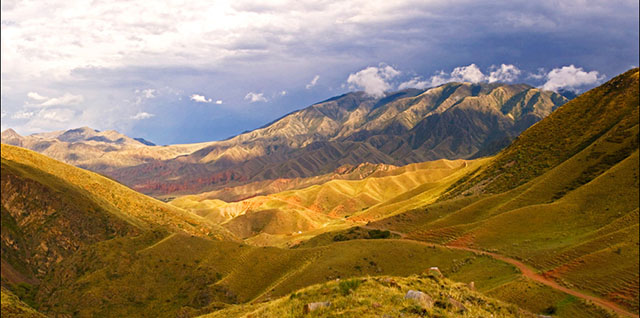哈萨克斯坦英文报导
They are amusingly called the “stan countries” – nations whose names end with the same syllable, “stan”. There are in total seven of them: Afghanistan, Kazakhstan, Kyrgyzstan, Tajikistan, Turkmenistan, Uzbekistan and Pakistan. To many, these countries lack personality. They are neither as fancy as Italy and France, nor as exotic as Egypt and Argentina, and can easily be mixed up with one another.
它们被戏称为“斯坦国”—— 这些国家的姓名都以相同的音节“斯坦”作结束。这样的国家总共有7个:阿富汗、哈萨克斯坦、吉尔吉斯斯坦、塔吉克斯坦、土库曼斯坦、乌兹别克斯坦以及巴基斯坦。关于许多人而言,这些国家缺少特性。他们不如意大利和法国花哨,也不像埃及和阿根廷那样具有异国风情,彼此之间还很简单弄混。
It wasn’t until this January, when DimashKudaibergen – a 23-year-old singer from Kazakhstan – appeared on Singer (《歌手》), a TV singing competition, that Chinese people were driven to tell one particular “stan country” apart from the rest of the group.
本年1月,23岁的迪玛希·库达依别列根登上了电视歌唱竞赛《歌手》的舞台。直到那时起,我国人才开端将这个国家和其他“斯坦国”区别开来。
And now, there are even more reasons for you to take notice of this Central Asian country. Chinese President Xi Jinping paid a state visit to Kazakhstan from June 7 to 10. During his four-day tour, Xi also attended the opening ceremony of the 2017 World Expo in Astana, Kazakhstan’s capital. It is the first World Expo to be held in Central Asia.
现在,你乃至还有了更多理由来重视这一中亚国家。6月7日-10日,国家主席习近平对哈萨克斯坦进行国事访问。在四天的行程中,习主席还参加了在哈萨克斯坦首都阿斯塔纳举办的2017年世博会开幕式。这也是世博会初次在中亚举办。
Only now are Chinese people starting to develop a curiosity for this neighboring country that we’ve been neglecting for so long.
现在,我国人才开端对这个长时刻被忽视的邦邻产生了猎奇。
In Kazakhstan, there is a famous proverb: “Songs and horses are the two wings of the Kazakh people.” From Kudaibergen’s singing, we have caught a glimpse of the country’s musical talent. And their love for horses comes from the country’s nomadic history, when people depended heavily on the animals – they rode them, used them for farming, raced them in competitions and ate their meat.
哈萨克斯坦有句闻名的谚语:“歌和马是哈萨克人的两只翅膀”。从迪玛希的歌声中,咱们得以一窥这个国家的音乐才调。而他们对马的酷爱则来历于这个国家的游牧前史,人们一度非常依靠这种动物 —— 他们骑马,用马犁地、举办赛马竞赛、吃马肉。
Even though many Kazakh people have now settled in towns and cities, leaving the old lifestyle behind, their love for horses never really changed. During the 2008 summer Olympics torch relay in Kazakhstan, for example, the torchbearers on horseback were one of the biggest highlights of the event. And Kazakh people still keep their habit of eating horsemeat, even if it’s hard for those from a different background to understand.
虽然现在不少哈萨克人已在乡镇久居,不再遵从曩昔的生活方式,但他们对马的酷爱从未改动。比方,2008年夏日奥运会火炬传递活动在哈萨克斯坦举办期间,马背上的火炬手是传递活动中最大的亮点之一。哈萨克人仍然保留着吃马肉的习气,虽然这一点让来自不同文化背景的人很难了解。
“Out of respect for horses, Americans don’t eat them. Out of respect for their horses, Kazakhs do,” wrote Ryan Bell on National Geographic during a trip to Kazakhstan.
“出于对马的尊重,美国人不吃马肉。而出于他们对马匹的尊重,哈萨克人吃马肉,”在一次前往哈萨克斯坦的旅途中,瑞安·贝尔在《国家地理》杂志上写道。
Perhaps as the world’s biggest landlocked (内陆的) country, Kazakhstan will always stay close to its nomadic history. After all, it’s what appears on its national emblem – a yurt and two horses, against the backdrop of a blue sky.
作为国际上最大的内陆国,哈萨克斯坦或许将一向与游牧前史休戚相关。究竟,这一切都体现在这个国家的国徽上了 —— 一片蓝天之下,一座圆顶帐子和两匹快马相辅相成。
哈萨克斯坦英文报导
- 抢手文章
-
奇特动物在哪里英文介绍 817 朴槿惠闺蜜门英文介绍 611 湄公河举动英文介绍 1410 七月与安生英文介绍 1421 釜山行英文介绍 3010 G20主办地杭州英文报导 657 W-两个国际英文介绍 591 薛之谦英文介绍 933 工业4.0英文Industry 4.0 571 美国队长3英文介绍 1791
